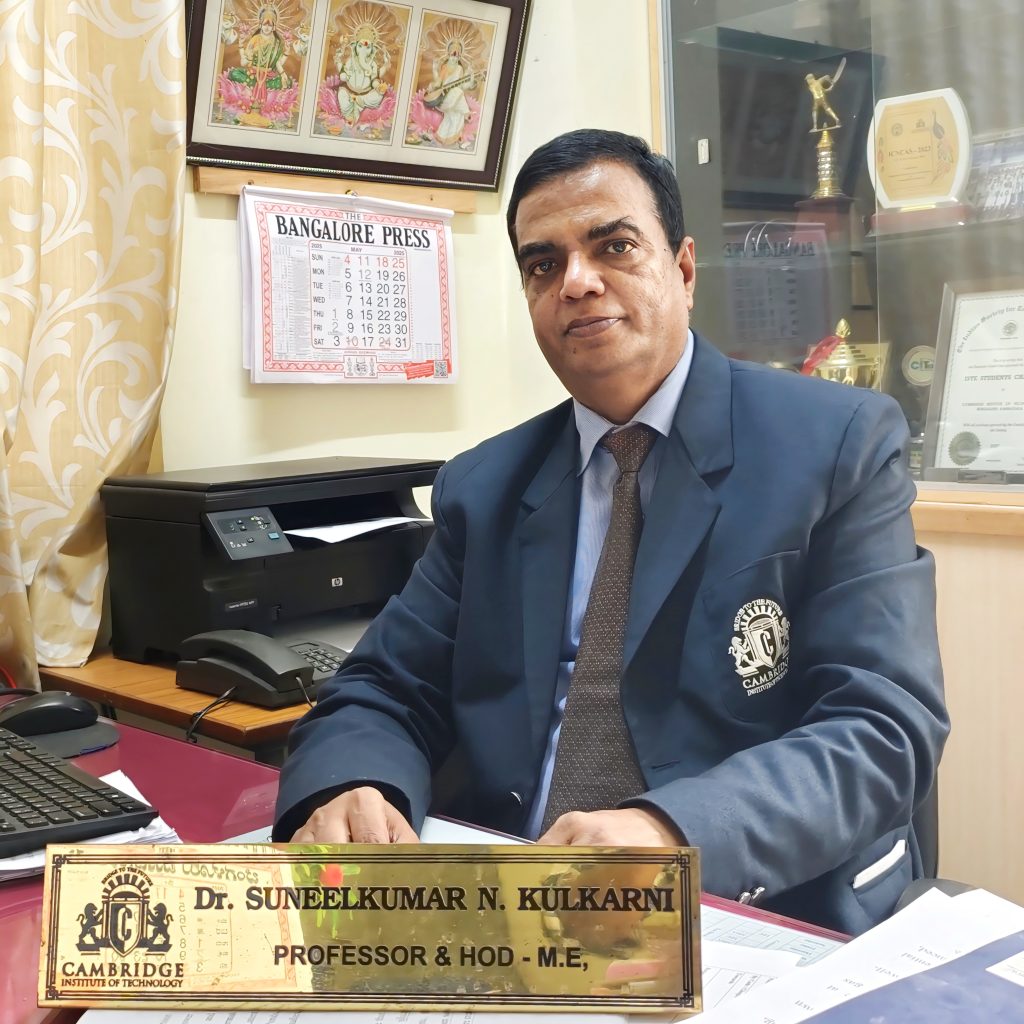*ADMISSIONS OPEN 2025-26* *LIMITED SEATS AVAILABLE*
Mechanical Engineering
The Department of Mechanical Engineering at Cambridge Institute of Technology (CIT) Bengaluru was established in 2010. The department has a student intake of 60 and is committed to providing students with a solid foundation in the fundamentals of mechanical engineering while encouraging innovation and practical application. Our curriculum is designed to provide graduates with the skills needed to succeed in a fast rapidly evolving technological environment. It also provides its students with excellent infrastructure, including well-established laboratories and computing centers, spacious and technologically equipped classrooms and seminar halls, highly qualified, experienced, and dedicated faculty members, practical-oriented teaching-learning, and so on.
We prioritize practical skill development through research, internships, and competitions, with personalized mentorship from our faculty of experienced industry professionals and researchers.
Strong industry ties ensure excellent placement opportunities, while our focus on developing communication, teamwork, and problem-solving skills produces well-rounded engineers. Our graduates excel in both industry and higher studies at prestigious national and international institutions.
Join the Mechanical Engineering Department at CIT, Bengaluru, and embark on a journey of innovation and excellence.
Vision
To impart quality education in Mechanical Engineering by developing core competencies and global professionalism.
Mission
M1. Empower students with domain knowledge and practical skills by competent faculty and infrastructure.<
M2. Adopt student-centric learning techniques to enhance analytical and problem solving skills.
M3. Develop communication, personal, interpersonal, leadership skills and societal values to be global professionals.
HOD's MESSAGE

Dr. Suneelkumar N Kulkarni
B.E,M.E,Ph.D
Professor and HoD
hod.mech@cambridge.edu.in
Dear Students, Alumni, and Partners,
We’re a hub of innovation, shaping future mechanical engineers. Our curriculum blends fundamentals with cutting-edge tech, preparing you for the 21st century.
Our Strengths:
- Experienced Faculty: Seasoned educators and industry experts, averaging 10 years, with 6 Ph.D.s and 7 pursuing them. Passionate mentorship and industry insights enrich learning.
- State-of-the-Art Labs: Foundational labs and advanced resources like 3D printers and a Cobot. AICTE IDEA Lab and Maker’s Space Skill Lab foster innovation.
- Industry Collaboration: Strong partnerships with Galactic 3D, EOS, Andrew Additive and BETA CAE Systems. Internships, projects, and technology transfer provide real-world experience. Dedicated placement support.
- Research & Innovation: Dynamic research culture, advanced facilities, and collaborative projects with industry and academia. Generates new knowledge and provides research experience.
- Holistic Development:Cultural and Extracurricular activities, competitions, and societies enrich student life.
We strive for continuous improvement and encourage you to explore our offerings.
Join us in this journey of discovery and innovation.
Thank you for your interest.
Program Education Objectives (PEOs)
PEO1: Apply the acquired knowledge in core and allied subjects of Mechanical Engineering to assimilate, design, analyze and create innovative products and services incorporating safety, sustainability and cost effectiveness.
PEO2: Be self-directed and research oriented keeping abreast of the advancements of Mechanical Engineering concepts and technology to resolve application level issues.
PEO3: Exhibit competency, leadership, entrepreneurship, inter-personal skills, thrust to lifelong learning consistently with utmost concern for socio-technological, cultural and global environment.
Program Specific Outcomes (PSOs)
PSO 1: An ability to apply the knowledge of mathematics, materials, and manufacturing technology to identify, formulate, and solve industry-related problems.
PSO 2: An ability to apply the principles of design, thermodynamics, fluid mechanics, mechatronics, and CAD/CAM tools to conceptualize and realize physical systems and processes.
PSO 3: An ability to develop professional competency in manufacturing, power plants, and the production industry in the context of operations and maintenance.
Programme Outcomes
- Engineering knowledge: Apply the knowledge of mathematics, science, engineering fundamentals, and an engineering specialization to the solution of complex engineering problems.
- Problem analysis: Identify, formulate, review research literature, and analyze complex engineering problems reaching substantiated conclusions using first principles of mathematics, natural sciences, and engineering sciences.
- Design/development of solutions: Design solutions for complex engineering problems and design system components or processes that meet the specified needs with appropriate consideration for the public health and safety, and the cultural, societal, and environmental considerations.
- Conduct investigations of complex problems: Use research-based knowledge and research methods including design of experiments, analysis and interpretation of data, and synthesis of the information to provide valid conclusions.
- Modern tool usage: Create, select, and apply appropriate techniques, resources, and modern engineering and IT tools including prediction and modeling to complex engineering activities with an understanding of the limitations.
- The engineer and society: Apply reasoning informed by the contextual knowledge to assess societal, health, safety, legal and cultural issues and the consequent responsibilities relevant to the professional engineering practice.
- Environment and sustainability: Understand the impact of the professional engineering solutions in societal and environmental contexts, and demonstrate the knowledge of, and need for sustainable development.
- Ethics: Apply ethical principles and commit to professional ethics and responsibilities and norms of the engineering practice.
- Individual and team work: Function effectively as an individual, and as a member or leader in diverse teams, and in multidisciplinary settings.
- Communication: Communicate effectively on complex engineering activities with the engineering community and with society at large, such as, being able to comprehend and write effective reports and design documentation, make effective presentations, and give and receive clear instructions.
- Project management and finance: Demonstrate knowledge and understanding of the engineering and management principles and apply these to one’s own work, as a member and leader in a team, to manage projects and in multidisciplinary environments.
- Life-long learning: Recognize the need for, and have the preparation and ability to engage in independent and life-long learning in the broadest context of technological change.





